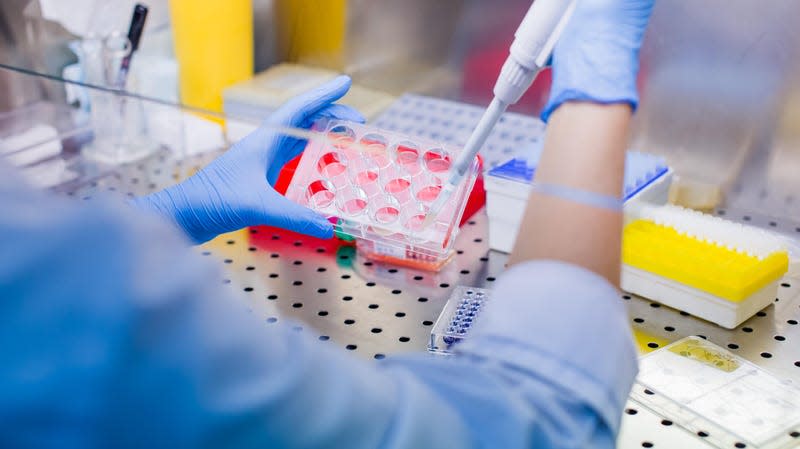Stem Cell Clinics Are Selling Shady, Unproven Treatments for Long Covid

Shady stem cell clinics are still peddling false hope to people dealing with covid-19, new research this week suggests. The study found dozens of clinics selling stem cell treatments for covid-related issues, especially long covid. These therapies often cost thousands of dollars, but there’s no good evidence that they work as advertised, the report authors say.
Stem cell therapy is legitimately exciting and may one day allow doctors to treat a variety of otherwise unrepairable injuries or medical conditions. Much of this work is still in its infancy, however, and it’s likely that many of its potential applications will not come to fruition. But that hasn’t stopped some for-profit clinics and doctors from selling stem cells to the public as a cure-all. These therapies may be described as experimental treatments being tested out in clinical trials, but clinics often don’t adhere to the regulations that govern such research, and patients will frequently spend their own money to take part in these “trials.”
Read more
How is Shedeur Sanders going to win the Heisman in a body brace?
F1 Television Camera Helicopter Hit By National Anthem Fireworks At U.S. Grand Prix
Saturday Night Live recap: Nate Bargatze hosts a lo-fi Halloween edition
Did ESPN really think nobody would care that they deepfaked a Damian Lillard interview?
Ineffectiveness aside, these treatments don’t come cheap. Many businesses did not provide upfront pricing information, but among those that did, the team found costs ranging $2,950 to $25,000, with the average cost being over $11,000 per treatment. The current nature of long covid—a chronic and often debilitating condition with no approved medical therapy—also means that many prospective customers are desperate and willing to pay a high cost, even for treatments that likely won’t work and that are potentially dangerous. Turner points out that people have experienced pulmonary embolisms, bacterial infections, and other serious complications like blindness from visiting these clinics.
On a positive note, Turner says, the Food and Drug Administration and other regulatory agencies have taken a more proactive approach in cracking down on these unlicensed and unapproved practices over the past few years. There also seems to be significant churn in the industry. Of the many businesses selling covid-related treatments that Turner identified in 2020, for instance, only one was still advertising them three years later.
It’s possible that the industry as a whole is beginning to shrink or at least slow down its expansion, though Turner says it’s too early to know for sure. The team’s other recent research suggests that around 500 stem cell businesses have left the marketplace since 2021, though hundreds others have joined in their place. And many businesses nowadays are crafty about their language, avoiding explicit health and safety claims in their marketing.
“Taking a long-term perspective, I’m hopeful that with time we’ll see fewer such businesses and a much better regulated marketplace. However, it’s possible that the situation could worsen,” he said. “It’s an uncertain time, and I’m hesitant to predict what shape this marketplace will take five or ten years from now.”
More from Gizmodo
Sit Down Somewhere! NoLa Karen Interrupts Street Performance
Amouranth’s Latest Business Venture Will Drive Her Haters To Drink
Matthew Perry is remembered by those who knew and admired him
Sign up for Gizmodo's Newsletter. For the latest news, Facebook, Twitter and Instagram.

